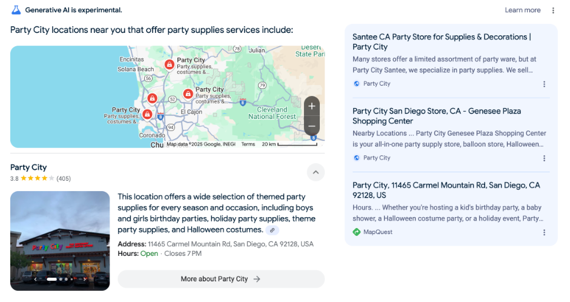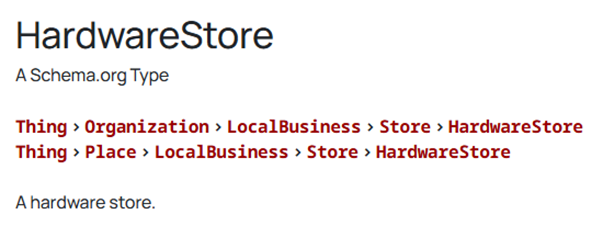Physical Address
304 North Cardinal St.
Dorchester Center, MA 02124
Physical Address
304 North Cardinal St.
Dorchester Center, MA 02124

Structured data markup can work diligently behind the scenes to help your local business shine online.
It can add eye-catching rich results to your search results, like review stars, FAQs, and breadcrumbs, that grab attention and encourage more clicks.
Structured data uses the standardized vocabulary of Schema to tell search engines – and even AI tools – exactly what your website is about, making it easier for customers to find you.
While it’s not a direct ranking boost, structured data plays a big role in making your business more visible, whether in traditional search results or AI-powered tools like Gemini or ChatGPT.
From a local ice cream shop to a hardware store, adding structured data can make a huge difference in boosting your local SEO and staying ahead in today’s ultra-saturated digital world. It often remains an untapped resource, despite its potential to significantly enhance your local SEO strategy.
This guide will equip you with actionable knowledge to use structured data markup to boost your local SEO and strengthen your visibility across search engines and AI platforms.
Structured data with Schema convey additional information to search engines so they can interpret and display your content more effectively, giving your business a competitive edge in search engine results pages (SERPs).
Google has consistently highlighted the importance of schema and structured data in delivering relevant, detailed information to users.
Implementing schema correctly can improve your visibility, attract more clicks, and even increase conversions.
Let’s clarify key terms related to schema and structured data markup.
Local search marketers often use the terms “schema”, “schema markup” and “structured data” interchangeably, but there are differences to understand.
Structured data is the format for organizing and describing information on a webpage. By implementing structured data markup to a page, you convey additional information and make it easier for search engines to accurately interpret your pages and display relevant snippets in SERPs.
Schema is an open source standardized vocabulary used to markup structured data. There are other vocabularies, but the search industry uses Schema.org which is a collaborative initiative founded by Google, Bing, Yahoo, and Yandex in 2011.
This vocabulary enables webmasters to tag elements like business names, addresses, phone numbers, customer reviews, and services.
Pages using structured data with schema are eligible for rich results, which can significantly improve how your business appears in search results.
Rich results (also known as rich snippets) are enhanced search elements that provide more detailed and visually engaging information.
Rich results can also be referred to as “SERP features.” Examples include:
Rich results not only improve click-through rates but also help your business stand out in competitive local search results.
A SERP feature is a specialized element on a search results page that provides extra information or functionality beyond standard results.
Examples include featured snippets, local packs, and knowledge panels. It is a broader category covering various elements, while a rich result enhances individual listings using structured data.
Structured data is an integral part of any business’s local SEO strategy for myriad reasons. Let’s explore each reason more in-depth.
Structured data acts as a translator, turning your website’s content into a format that search engines can easily understand and classify.
This allows Google, large language models (LLMs), and other engines to identify key information such as your business hours, location, services, and customer ratings.
The better search engines understand your site, the more likely they are to display relevant information to users.
Rich results generated from structured data are more visually appealing than standard search results.
For example, a local bakery using schema markup might appear with review stars, a photo, operating hours, and a “Place an Order” button directly in the SERPs.
This enhanced visibility can drive more traffic to your site and attract higher-quality leads.
Pages featuring rich results typically enjoy higher click-through rates (CTRs) compared to those with standard results.
By giving users detailed information upfront – such as pricing, availability, or reviews – you make it easier for them to decide to engage with your business.
In saturated local markets, structured data markup can differentiate your business from competitors.
If your competitor’s listing only shows basic details while yours features rich elements like sitelinks or a star rating, potential customers are more likely to click on your result.
As voice search grows in popularity, structured data becomes even more important.
Devices like Google Assistant rely heavily on schema to deliver concise, accurate answers to voice queries.
For example, adding a “FAQ” schema to your site can make your business the top result when users ask questions like, “Where’s the best coffee shop near me?”
As evidenced above, structured data serves as a vital tool for local businesses, helping search engines understand and present your information more effectively.
For businesses aiming to improve visibility in local search results, structured data provides an opportunity to display essential details in a highly appealing format.
With schema, businesses can highlight critical information such as:
For example, a local bakery could use structured data to feature customer reviews, a “Place an Order” button, and seasonal promotions.
An event venue might showcase upcoming events with dates, times, and ticket links, making it easier for potential customers to engage directly from search results.
Here’s how structured data benefits local businesses in practice:
These enhancements create a competitive edge by presenting detailed and relevant information before the customer even clicks on your website.
Structured data on a location page doesn’t directly affect Google Business Profile (GBP) features like the Map Pack or reviews, but it enhances organic search features, such as rich results, by improving how search engines interpret your website.
While schema doesn’t directly impact GBP rankings, it complements them by ensuring consistent, accurate data across platforms, boosting credibility and visibility.
Including details like address, hours, and services in structured data helps Google associate your site with your GBP listing and can even fill gaps in unclaimed profiles.
Structured data is not a direct ranking signal in search engine algorithms, as confirmed by Google representatives like John Mueller.
However, it is essential for boosting a website’s visibility and engagement, both of which can impact search rankings.
By organizing information for easy interpretation, structured data improves how content appears in search results, encouraging clicks and interaction.
The rise of AI in search engines and virtual assistants has redefined how structured data impacts digital visibility.
Once primarily a tool for helping search crawlers understand webpage content, structured data now plays a vital role in ensuring local landing pages perform well in AI-driven platforms like Gemini, Bing Chat, ChatGPT, and voice assistants such as Amazon Alexa and Google Assistant.
Structured data is essential for AI systems like ChatGPT, helping them deliver accurate and relevant information.
Local landing pages using structured data, such as LocalBusiness or GeoCoordinates schema, provide a framework that AI can easily process for precise results.
For instance, structured data defining a business’s address, hours, and reviews allows AI platforms to seamlessly integrate this information into conversations.
 Screenshot from search, Google, January 2025 – Brand Retailer Local Page AI Overview Example (webpages are utilizing advanced schema)
Screenshot from search, Google, January 2025 – Brand Retailer Local Page AI Overview Example (webpages are utilizing advanced schema)AI search systems increasingly focus on localization, making structured data essential for businesses targeting specific geographic areas.
Key schema types that enhance localization include:
Structured data is essential for local business websites aiming to improve visibility in search engine results.
While many local sites have basic structured data enabled, implementing detailed and well-validated markup can significantly enhance search engine performance and qualify pages for rich results.
Below is a comprehensive guide to applying schema markup effectively.
Choosing the appropriate Schema.org category is critical for ensuring an accurate representation of your business in search results.
Schema.org provides various categories specifically tailored for local businesses. For example:
If no specific category exists for your business, use the general schema.org/LocalBusiness.
Additionally, if you’re technically inclined, you can propose new categories via the Schema.org GitHub forum.
 Screenshot from schema.org, January 2025 – Recommended Local Business Schema for a Hardware Store
Screenshot from schema.org, January 2025 – Recommended Local Business Schema for a Hardware StoreAfter selecting the correct category, include the following required schema properties to ensure validation and avoid disqualification from rich results:
These properties are not required but are highly recommended for enhancing visibility:
For businesses seeking even more advanced features, consider these schema types:
Proper validation is critical for ensuring your structured data qualifies for rich results. Google provides several tools for this purpose:
 Screenshot from Schema Markup Validator, January 2025 – Validated Schema Example (validated with no errors/warnings)
Screenshot from Schema Markup Validator, January 2025 – Validated Schema Example (validated with no errors/warnings)
 Screenshot from Google Search Console, January 2025 – Google Search Console Enhancements Reporting Example
Screenshot from Google Search Console, January 2025 – Google Search Console Enhancements Reporting ExampleTracking your rich results’ performance helps you understand the impact of your schema implementation.
Third-party tools like Semrush offer “SERP feature” reports that show the aggregate rich results your site is earning. This data can be used to identify further optimization opportunities.
 Semrush SERP Features Trend Example
Semrush SERP Features Trend ExampleAdding structured data to your location pages is a powerful way to enhance local SEO and improve how search engines and AI systems display your business.
Structured data is especially important for AI, as it helps models like ChatGPT and search assistants better understand and showcase your business details.
It also ensures your website’s information aligns with your Google Business Profile, even if your listing is incomplete or unclaimed.
By making key information easy to find, structured data benefits both AI systems and customers.
With better visibility, higher click-through rates, and a stronger online presence, schema markup is a must for local businesses. Add it to your location pages today to stand out and connect with more customers.
By following these steps, local businesses can maximize the visibility and effectiveness of their structured data, ultimately driving more traffic and engagement through enhanced search results.
Special thanks to Chad Klingensmith, Sr. SEO Strategist at Rio SEO, for his extensive contributions to this article. His in-depth knowledge of structured data ensures the accuracy and relevance of the insights shared here.
More Resources:
Featured Image: pixadot.studio/Shutterstock